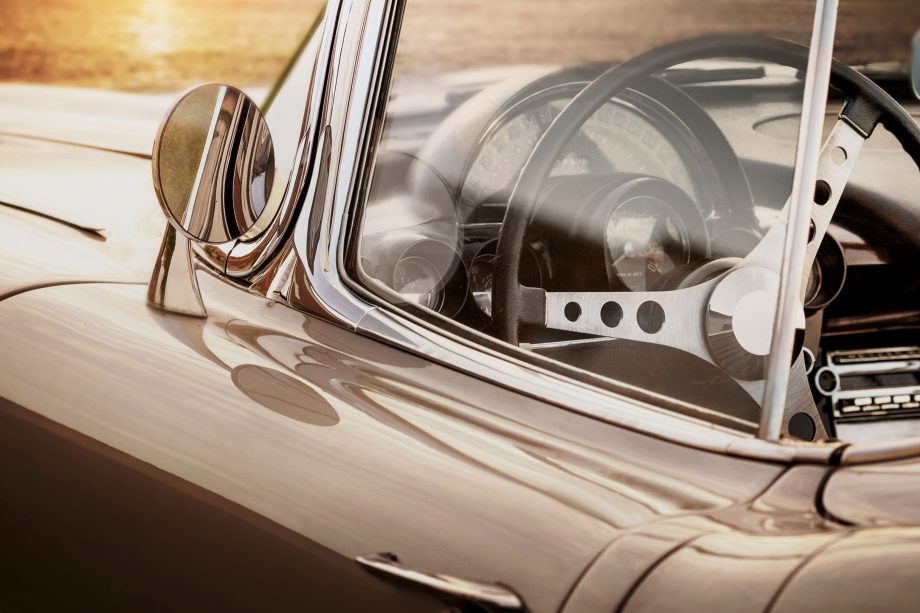Protect your passion: Make the most of your car collection

At J.P. Morgan Private Bank, we work to help you experience the full spectrum of what your wealth can create. Of course, your wealth does not define you, even as it can help you achieve your unique ambitions and passions. Be intentional. Make sure that your particular passions are an integral part of your holistic wealth plan.
Collectors are generally known for their passionate enthusiasm—whether they’re acquiring Picasso lithographs or rare first edition books. Among the most fervent of collector groups are auto collectors. At Monterey Car Week 2023, RM Sotheby’s shocked the automotive world by unveiling an assembly of blue-chip Ferraris that were discovered in varying states of disrepair due to Hurricane Charley in 2004. The auction commanded a total of over $17 million, reflecting the undiminished appeal of these rare and treasured Ferraris2.
If you are one such enthusiast, you are not alone. Professionals estimate that there are about 43 million collector vehicles in the United States. The combined value of those 43 million collector cars represents an estimated $1 trillion in total insurable value.1 But while enthusiasm for cars is well understood, how a car collection can fit into a larger wealth picture may be more opaque.
At J.P. Morgan Private Bank, we encourage you to be intentional about your plan, and we are ready to help you make the most of your passion. Here are some of the key considerations for your treasured collection:
- Safeguard your wealth and privacy with an LLC
- Set aside funds to maintain the collection
- Prepare an exit strategy: Consider establishing a trust or foundation
Consider an LLC to safeguard your wealth and privacy
A large collection can attract attention—some wanted, some less so. In a world of social media and cybersecurity risks, owning your collection in an LLC structure can make a lot of sense.
If you are a collector who buys vintage cars in your own name, that information is more than likely publicly discoverable. What you bought and when, as well as the prices you paid—all are exposed to whomever takes the time to look. In contrast, if you buy your cars through an entity such as an LLC that does not bear your name, you can maintain discretion and privacy.
An LLC structure can also help protect you in the event of an accident. Imagine this scenario. A collector decides, for charity, to auction off to the highest bidder the opportunity to get behind the wheel of a vintage car that he owns in his own name. During the brief drive an accident occurs, resulting in damage and injuries. The owner of the car collection could be held personally liable for all damages and uncovered medical expenses, leaving the collection and other assets exposed.
Set aside funds to maintain the collection
Some collectors view their collections as part of their legacies, and wish them to remain intact even when they are no longer around to enjoy them. But collections are often liquidated or dismantled for one of two reasons: to pay taxes when the collections are passed to heirs, or when it proves too costly to properly maintain the fleet. Using a multi-generational vehicle such as a trust may reduce the tax burden, and also allow you to put money aside for general maintenance, insurance and storage of your vehicles. Perhaps the car collection is housed in a barn. You may want money for future capital improvements to the structure—during and potentially beyond your own lifetime.
Establish an exit strategy or succession plan
An important generational shift is underway. It’s likely to result in the largest transfer of assets in history, and the car market is not immune. It is estimated that baby boomers own 60% of the collectible market, but millennials are now the more active buyers3.
As this shift continues, it is important to be thoughtful and intentional about your collection’s future. Might you one day want to sell your collection? And what should be done after you pass? Do you want the collection to remain intact? Or would you prefer that your heirs decide which cars to sell or keep? Whatever you decide, you want to be sure your wishes will be honored.
Say that you’ve determined to place your car collection in some kind of a structure. You can choose a foundation or trust. Both methods are forms of tax mitigation, but also ensure that the wishes of your legacy are followed properly. Here are two case studies of collectors who made different choices:
1. Private Operating Foundation
U.S. collector John owned an extensive collection of 40 iconic cars valued at $50 million. He opted to set up a private operating foundation, which then owned the cars. About $10 million in liquid assets was earmarked for collection maintenance. John wanted to be sure that his vehicles could be displayed at various car shows around the world, and the private foundation helped make that possible.
His financial and estate advisors explained that an operating foundation must satisfy certain conditions, but once satisfied, the tax benefits are simple. The operating foundation is federally tax exempt, so John could make gifts to the foundation and pay no gift tax, and also receive an income tax deduction. If the assets of the operating foundation generated income, only a modest excise tax would apply. And when John died, there would be no estate tax to be paid on the foundation’s assets. All in all, on his $60 million foundation, John reduced his gift and estate tax liability by $24 million.
2. Trusts and LLCs
Collector Joan opted to have an LLC own the cars, and she put the LLC shares equally into trusts benefiting her children. A trustee provided management and oversight of the LLC and vehicles. Like John, Joan placed $10 million in liquid assets in the LLC to generate income to cover vehicle expenses. When she gifted the LLC shares to the trusts, she retained some control over the management of the cars. This reduced the value of the gift, enabling Joan to make a meaningful reduction in her gift and estate tax liability. When Joan passes away, the interest she retained to control the management of the vehicles could be transferred directly to her descendants or to the trust, allowing the trustee to assume full responsibility for the collection.
We can help
What strategy might work best for you and your collection? Your J.P. Morgan team is available to work with you, your tax advisor and your estate planning lawyers to help you get the most out of your car collection.
Sources:


